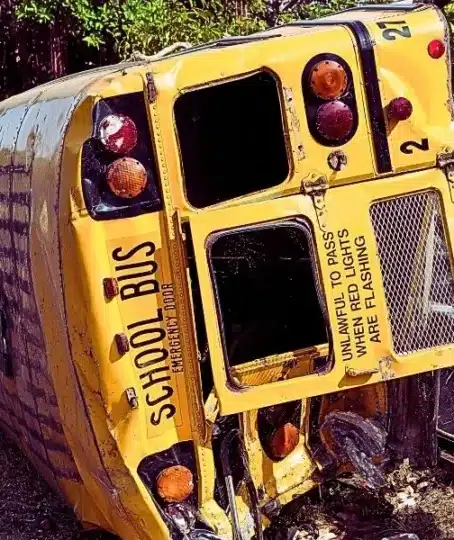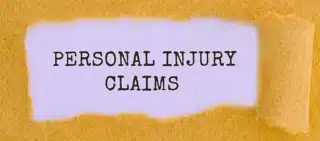
When a Dog Attacks Again and Again If dogs attack once, it’s alarming. When they attack five times, it’s no...


A tragic collision between a school bus and a semi-truck on Route 24 in Rushville, Illinois, resulted in the deaths of five individuals, including three children. The victims are identified as David Coufal, 72; Angela Spiker, 57; and three young children—Maria Miller, Andrew Miller, and Noah Driscoll, all from Rushville. The crash occurred when the bus veered into oncoming traffic, colliding with the truck, which led to both vehicles catching fire. The local school district has canceled classes for the following two days and provided counseling services.
If your child was hurt while in the care of the school district, you have rights. Call a truck accident lawyer at Strong Law Offices today. 309-393-2928.

In Illinois, a school may be held liable for children's injuries or deaths under certain circumstances. Liability hinges on whether the school or its staff acted negligently, breaching a duty of care owed to students.
To establish liability, plaintiffs must demonstrate the four elements of negligence:
Schools have a duty to provide a safe environment for students. This includes ensuring the physical safety of students on school grounds, during school activities, and while being transported in school vehicles. This duty extends to:
A school may be liable if it is proven that negligence occurred, meaning the school failed to meet its duty of care. If a child is injured due to a lack of supervision, such as an accident during recess or physical altercations, the school may be liable. Injuries resulting from unsafe facilities, such as faulty playground equipment or unsafe buildings, may lead to liability if the school failed to address known hazards. If a school bus accident results from poor maintenance or driver negligence, the school or the bus company may be held responsible.
In Illinois, a school district can be held liable for the actions of its bus drivers. Generally, this liability is grounded in the principle of vicarious liability, which holds employers responsible for the actions of their employees performed within the scope of their employment.
For a school district to be liable for a bus driver's actions, it must be shown that the driver was acting within the scope of his or her employment at the time of the incident. This means the driver was performing duties related to their job, such as transporting students to or from school or during school-sponsored activities. If the driver was engaged in personal activities or was outside his or her work duties when the incident occurred, the school district may not be held liable.
The school district’s liability hinges on whether the bus driver’s actions were negligent. For example, if a bus driver’s reckless driving or failure to follow safety protocols results in an accident, and it is proven that such actions were a breach of the standard of care expected of a professional driver, the school district can be held accountable. However, if the driver’s actions were found to be grossly negligent or intentional misconduct, the liability might also extend to the driver directly.
Illinois law supports the notion that school districts are responsible for the conduct of their employees when those employees are performing job-related duties. The district must ensure that bus drivers are properly trained, adhere to safety regulations, and operate vehicles in a manner that prioritizes student safety. Failure to meet these responsibilities can contribute to liability.
You can sue for a school bus accident in Illinois if you have suffered harm due to the negligence of the bus driver, the school district, or other parties involved. The process generally involves proving liability and showing that the negligence directly caused the injury.
In a school bus accident, several parties could be liable. These include the bus driver, the school district, and other entities like a bus maintenance company. To establish liability, you must demonstrate that the responsible party breached a duty of care. For instance, if the bus driver was speeding, distracted, or otherwise driving recklessly, this could be grounds for a lawsuit. Similarly, if the school district failed to maintain the bus properly or inadequately supervised the driver, they might also be held responsible.
To succeed in a lawsuit, you need to prove negligence. This involves showing that the responsible party had a duty to act with reasonable care, breached that duty, and that this breach directly caused the accident and your injuries. For example, if a driver ignored safety regulations, this failure must be linked to the accident and your resulting harm.
If the school district is at fault, suing may involve proving that the district’s negligence in hiring, training, or supervising the bus driver contributed to the accident. The district may also benefit from some level of governmental immunity, which can affect your claim.
In Illinois, parents can file a wrongful death claim on behalf of deceased children. Under Illinois law, a wrongful death claim allows family members to seek compensation for the loss of a loved one due to another party's negligence or misconduct. When a child dies due to such wrongful acts, the parents or legal guardians have the right to file a claim.
Illinois’ Wrongful Death Act provides that parents are eligible to file a wrongful death lawsuit if their child has died as a result of someone else's negligence. This can include cases involving medical malpractice, motor vehicle accidents, or unsafe conditions that lead to fatal injuries. To bring a successful wrongful death claim, parents must prove that the death was caused by the defendant’s breach of duty, which directly led to the child's death.
While parents can seek damages for the loss of their child, the types of compensation available may differ from cases involving adult victims. Illinois law allows for recovery of damages related to funeral expenses, loss of companionship, and emotional suffering. However, damages for economic losses such as lost future earnings are typically not applicable in cases involving children.
Parents or legal guardians must file the wrongful death claim within the statute of limitations, which is generally two years from the date of the child’s death. Prompt action is crucial to ensure that evidence is preserved, and legal deadlines are met.
Given the complexities involved in wrongful death cases, especially those concerning children, consulting with an attorney who practices wrongful death and personal injury law is recommended. An attorney can help navigate the legal process, gather necessary evidence, and ensure that the claim is pursued effectively.
When pursuing a lawsuit against a school district, understanding relevant laws and overcoming challenges is crucial.
In Illinois, several laws govern lawsuits against school districts. Key among these is the Illinois Local Governmental and Governmental Employees Tort Immunity Act, which provides limited immunity to public entities, including school districts. This law shields school districts from certain types of claims, particularly those related to discretionary functions, which involve policy decisions rather than day-to-day operational tasks. For example, while a school district might be protected from lawsuits related to policy decisions on school closures, it can still be liable for negligence in providing a safe environment or proper supervision.
Additionally, the Illinois School Code mandates specific standards for safety and supervision within schools. If a district fails to adhere to these standards, it could be held liable for resulting injuries. This includes maintaining safe facilities and ensuring adequate supervision during school activities.
One challenge in these cases is the immunity provisions under the Tort Immunity Act. These provisions can limit the types of claims that can be brought against a school district and may restrict the damages that can be recovered. For instance, if the claim relates to a decision made by the school board or administrative policies, immunity may apply.
Another challenge is proving negligence. Establishing that a school district breached its duty of care involves demonstrating that the district’s actions or inaction directly caused harm. This requires detailed evidence, such as incident reports, witness testimonies, and expert opinions on the standard of care expected in school settings.
Statutory deadlines also pose a challenge. In Illinois, the statute of limitations for filing personal injury claims against public entities is typically one year from the date of the injury or its discovery. Adhering to this deadline is crucial, as missing it can result in losing the right to sue.
School districts often have legal resources to defend against claims, so consulting with an attorney familiar with cases involving public entities is essential to effectively manage the complexities and challenges of such lawsuits.
Pursuing a lawsuit against a school district involves navigating legal immunities, proving negligence, adhering to statutory deadlines, and overcoming challenges associated with public entity defenses. Understanding these factors is critical for a successful legal action.If your child is injured or killed in a school bus accident, you have the right to seek justice against the responsible party. However, going it alone puts your rights at risk of violation. Additionally, processing grief while trying to navigate a case against a school district can feel like an insurmountable task. A personal injury lawyer at Strong Law Offices can help you file your case, so you can focus on healing.

When a Dog Attacks Again and Again If dogs attack once, it’s alarming. When they attack five times, it’s no...

Overview of the Personal Injury Claim Process in Illinois No one expects to suffer an injury or get involved in...

Exploring Caps on Damages in Illinois Personal Injury Cases Illinois does not have laws capping damages in successful personal injury...